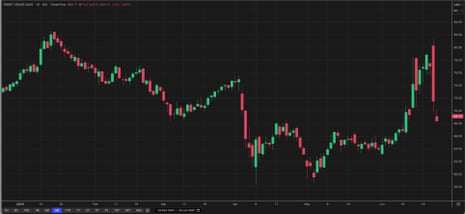Introduction: Oil falls back as geopolitical fears ease
Good morning, and welcome to our rolling coverage of business, the financial markets and the world economy.
The geopolitical fears that have gripped the markets for almost two weeks are fading, after President Trump declared that Israel and Iran have negotiated a ceasefire.
The oil price has slumped back to its levels before the Israel-Iran conflict began, easing fears of a stagflationary slump hurting the world economy.
Brent crude tumbled on Monday, as hopes rose for a lasting pause in the Middle East clashes. It’s dropped by another 3.1% this morning to $69.25 per barrel.

That’s Brent’s lowest level since 11 June, the day before Israel launched a series of strikes against Iran’s nuclear and military sites.
Monday’s selloff was a surprise – oil slumped after Iran launched a retaliatory missile strike on a US airbase which was well-telegraphed in advance, and unsuccessful.
That eased fears that Tehran might attempt to close the strait of Hormuz, disrupting the flow of a third of the world’s oil.
The oil selloff continued on Tuesday morning, after Donald Trump declared that a ceasefire between Israel and Iran was in force.
Just after 6am UK time, he posted:
“THE CEASEFIRE IS NOW IN EFFECT. PLEASE DO NOT VIOLATE IT! DONALD J. TRUMP, PRESIDENT OF THE UNITED STATES!”
Markets across the Asia-Pacific region have rallied, while the US dollar is dipping as investors move out of safe-haven currencies (details to follow..).
The agenda
-
8am BST: UK grocery inflation report from Kantar
-
11am BST: CBI industrial trends report on UK factory sector
-
2.30pm BST: Treasury committee hearing into fair pricing
-
3pm BST: Bank of England governor Andrew Bailey testifies to the Lords Economic Affairs Committee
-
3pm BST: Federal Reserve chair Jerome Powell testifies to Congress 3pm
Key events
Oil rising after Israel claims Iran has violated ceasefire
Oil is now moving higher again, as doubts emerge over the solidity of the ceasefire.
Brent crude is now trading at $69.67 per barrel – that’s still down 2.5% today, but higher than the $67.50 level it fell to earlier this morning.
Oil has risen in the last few minutes, after Israel accused Iran of violating the ceasefire.
Israeli defence minister Israel Katz has said he has ordered the country’s military to respond forcefully.
US-UK trade deal to come into force on Monday

Lisa O’Carroll
The US-UK trade deal bringing tariffs down to 10% on auto sector and zero on steel will come into force next Monday, after the Trump administration put the agreement on the official register on Monday night, my colleague Lisa O’Carroll reports.
Amazon announces major UK expansion

Sarah Butler
Amazon has confirmed plans to build four new distribution centres, two new head office buildings and “upgrade and expand” its existing network of over 100 buildings across the country creating thousands more jobs in the next three years.
The company claimed that the developments, some of which had already been announced, plus its investment in workers’ salaries and other operational payments would add £38bn to the UK economy over the period.
Amazon already employs over 75,000 people in the UK and the investment includes a number of previously announced plans including distribution centres in Hull and Northampton – which are set to open this year and next which it said would employ 2,000 people each. Thousands more will be employed to help run two additional warehouses planned for the East Midlands in 2027 or 2028.
The investment also includes the building of new data centres, which had already been announced, and the redevelopment of the historic Bray Film Studios in Berkshire, and TV and film productions for its Prime service.
Prime Minister Keir Starmer, who met Amazon’s chief executive Andy Jassy last week, said the investment was “a massive vote of confidence in the UK as the best place to do business” and meant “thousands of new jobs—real opportunities for people in every corner of the country to build careers, learn new skills, and support their families.”
However, the investments come amid fears that major high street retailers are losing out to online specialists such as Amazon partly because of the business rates regime which is based on property. The government promised to adjust the rates regime so that the likes of Amazon paid more. However its current plans for reform mean any business trading from the largest high street stores will increase their payments from next year.
A digital services tax, introduced to try and level the playing field between high street and online retail, is seen as insignificant with its future potentially in doubt amid negotiations with the US over import tariffs.
In 2023, Amazon’s main UK division paid corporation tax for the first time since 2020 after the end of a “super-deduction” tax break introduced by Rishi Sunak.
UK grocery inflation hits highest level since March 2024
The tumble in the oil price will ease concerns that consumers will be hit by higher fuel and transport costs.
But the latest news on inflation is less welcome.
Annual British grocery price inflation rose to 4.7% for the four weeks to June 15, its highest level since March last year, data from market researcher Kantar shows.
That’s an increase from 4.1% a month ago, showing that the squeeze on households is tightening.
Airlines are continuing to halt some flights to the Middle East, due to safety concerns, despite this morning’s ceasefire news.
British Airways says it has suspended all flights to Doha up to and including June 25, Reuters reports.
And budget carrier Wizz Air is cancelling flights to and from the United Arab Emirates until June 30.
Equity markets are soaring off the back of the Israel-Iran ceasefire news, reports Chris Beauchamp, chief market analyst at IG:
“Markets have cheered the news of a ceasefire in the Middle East, rallying hard as the prospect of a conflict between the US and Iran recedes into the background. The Israeli attack on Iran came as a surprise, as did the US strike at the weekend, but the pause in the fighting removes a key worry for investors and puts a sustained rally in equities back on the table.”
“There are still hurdles to navigate, most notably the 8 July deadline for trade deals, but for the moment the market thinks that there will be some kind of fresh extension. Slumping oil prices have negated some inflation fears for now, and with two Fed governors calling for rate cuts the overall tone continues to be supportive for risk assets.”
European stock markets
The rally is sweeping across European stock markets this morning, as volatility drops
Germany’s DAX index is 1.8% higher in early trading, while France’s CAC is 1.44% higher and Spain’s IBEX has gained 1.45%.
The EURO STOXX volatility index, a gauge of fear in the markets, has tumbled by 3.1 points to 19.31, the lowest since 12 June.
Travel and leisure stocks across Europe are rallying too.
This has pushed up the STOXX Europe travel and leisure index by 4.1% in early trading, which Reuters reports it the biggest one-day jump since 10 April.
The smaller FTSE 250 index, of medium-sized companies listed in London, is also pushing higher.
It’s gained 176 points, or 0.85%, to 21297 points.
Airline Wizz Air (+7.2%) and cruise operator Carnival (+5.5%) are the top risers.
FTSE 100 jumps on ceasefire release
Shares are rallying in London at the start of trading, as investors welcome signs of de-escalation in the Middle East.
The FTSE 100 share index of large, blue-chip companies has jumped by 50 points, or 0.57%, to 8808 points
Airline and hotel companies are surging, and leading the risers, such as easyJet (+7%), British Airways parent company IAG (+7.7%) and InterContinental Hotels (+4.3%).
But shares in oil producers are tumbling, with Shell (-4.2%) and BP (-6%) leading the FTSE 100 fallers.
Chinese port activity hits record after trade truce with US
If the Israel-Iran ceasefire holds, investors could return to worrying about a global trade war instead.
The clock is ticking towards 9 July, when the 90-day tariff pause set by president Trump in April expires.
So far, the UK is the only country to have signed a trade deal with the US since the ‘Liberation Day’ announcement of hefty new tariffs.
Concerns that tariffs could be reimposed next month have driven a surge of imports into the US.
Chinese ports just had their busiest week on record, probably due to exporters racing to get goods into the US as quickly as possible, after Beijing and Washington agreed a “framework agreement” at talks in London this month.
Some 6.7 million standard containers were shipped domestically and internationally last week, the Ministry of Transport said on Tuesday.
The almost 6% jump in traffic from the previous week came after a trade truce agreed with Washington earlier in June. In May, Chinese exports to the US fell the most since the early days of the pandemic.
Vietnam, Taiwan and Thailand have all reported record exports to the US in May, while shipments from South Korea were near a record last month.
Oil now down 5% after Israel confirms ceasefire
Oil has pushed even lower, after the Israeli government confirmed reports that it agreed to a ceasefire proposal brokered by the US.
Israel says:
Israel thanks President Trump and the United States for their support in defense and their participation in eliminating the Iranian nuclear threat.
In light of achieving the objectives of the operation, and in full coordination with President Trump, Israel has agreed to the president’s proposal for a bilateral cease-fire.
This has pushed Brent crude down by 5% today, to below $68 per barrel, adding to the 7% tumble on Monday.
Our Middle East liveblog has all the latest developments:
Trump demands hefty cuts to US interest rates
Fresh from declaring peace in the Middle East, president Trump has returned to a favourite topic – blasting America’s top central banker.
Posting on his Truth Social site, Trump claims rates should be “two to three” percentage points lower, and claims Federal Reserve chair Powell is “dumb” and incompetent.
Trump, who is due in The Hague later today for the Nato summit, wrote:
“Too Late” Jerome Powell, of the Fed, will be in Congress today in order to explain, among other things, why he is refusing to lower the Rate. Europe has had 10 cuts, we have had ZERO. No inflation, great economy – We should be at least two to three points lower.
Would save the USA 800 Billion Dollars Per Year, plus. What a difference this would make. If things later change to the negative, increase the Rate. I hope Congress really works this very dumb, hardheaded person, over. We will be paying for his incompetence for many years to come. THE BOARD SHOULD ACTIVATE. MAKE AMERICA GREAT AGAIN!
[Factcheck: the European Central Bank has actually cut interest rates eight times, not 10, in the last year.]
The Fed last cut interest rates in December 2024, to a range of between 4.25% and 4.5%, and has held them since – partly due to fears that Trump’s trade wars will push up prices.
Despite all the fears over the weekend, over the last 12 hours we’ve seen a pretty remarkable de-escalation of tensions in the Middle East, reports Deutsche Bank’s market strategist Jim Reid.
The best scorecard of this has been the price of oil which now trades just below $70/bbl, having opened at just over $80/bbl early yesterday morning in Asia.
Brent crude (-7.18%) posted its biggest daily decline since 2022 and is subsequently trading another -2.56% lower this morning at $69.65/bbl, close to the levels before Israel’s strikes against Iran on June 13. Easing geopolitical concerns helped the S&P 500 rebound +0.96%, with futures another +0.55% higher overnight.
Dollar down
The US dollar has weakened against a basket of currencies this morning.
This has pushed the pound up by half a cent, to $1.3575, and the euro by a third of a cent to $1.161.
The US dollar’s status as a safe-haven currency has been questioned recently, due to fears over America’s debt pile and trade war fears. These moves, though, suggest it has benefitted from safe-haven inflows, which are now unwinding.
Asia-Pacific markets rally
Stock markets across the Asia-Pacific region have been swept higher by hopes of a lasting ceasefire in the Middle East.
China’s main markets are up between 1.1% and 1.6%, with Hong Kong’s Hang Seng gaining 1.8%.
In South Korea, the KOSPI index has jumped over 3%, while Japan’s Nikkei 225 is up 1.3%.
The ‘“tentative ceasefire” between Iran and Israel is supporting a relief rally, reports Kyle Rodda, senior financial market analyst at capital.com, who explains:
The moves in the markets have been considerable, especially as market participants priced-out the war premium that had been slowly discounted over the course of the past fortnight and had briefly increased at the Asian open yesterday.
Oil prices are down almost 9% on that fact alone, taking pressure off yields and helping stock valuations rebound, with Wall Street surging, led by longer-duration stocks in the tech space. Ultimately, the drop in implied volatility also boosted stocks prices, as investors looked beyond the conflict between Iran and Israel.
There is always the risk of complacency and that these moves are premature. But, once again, as long as the aforementioned parameters remain unmet, the moves are likely to stick.
Introduction: Oil falls back as geopolitical fears ease
Good morning, and welcome to our rolling coverage of business, the financial markets and the world economy.
The geopolitical fears that have gripped the markets for almost two weeks are fading, after President Trump declared that Israel and Iran have negotiated a ceasefire.
The oil price has slumped back to its levels before the Israel-Iran conflict began, easing fears of a stagflationary slump hurting the world economy.
Brent crude tumbled on Monday, as hopes rose for a lasting pause in the Middle East clashes. It’s dropped by another 3.1% this morning to $69.25 per barrel.
That’s Brent’s lowest level since 11 June, the day before Israel launched a series of strikes against Iran’s nuclear and military sites.
Monday’s selloff was a surprise – oil slumped after Iran launched a retaliatory missile strike on a US airbase which was well-telegraphed in advance, and unsuccessful.
That eased fears that Tehran might attempt to close the strait of Hormuz, disrupting the flow of a third of the world’s oil.
The oil selloff continued on Tuesday morning, after Donald Trump declared that a ceasefire between Israel and Iran was in force.
Just after 6am UK time, he posted:
“THE CEASEFIRE IS NOW IN EFFECT. PLEASE DO NOT VIOLATE IT! DONALD J. TRUMP, PRESIDENT OF THE UNITED STATES!”
Markets across the Asia-Pacific region have rallied, while the US dollar is dipping as investors move out of safe-haven currencies (details to follow..).
The agenda
-
8am BST: UK grocery inflation report from Kantar
-
11am BST: CBI industrial trends report on UK factory sector
-
2.30pm BST: Treasury committee hearing into fair pricing
-
3pm BST: Bank of England governor Andrew Bailey testifies to the Lords Economic Affairs Committee
-
3pm BST: Federal Reserve chair Jerome Powell testifies to Congress 3pm





